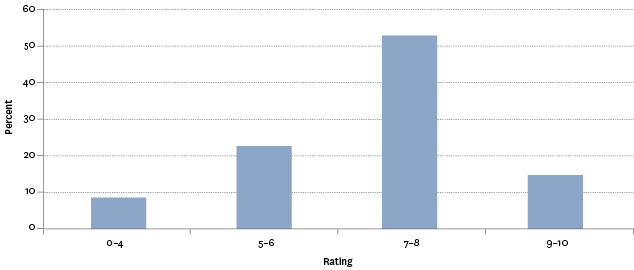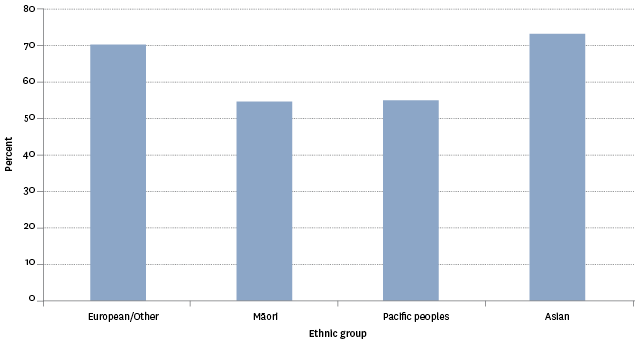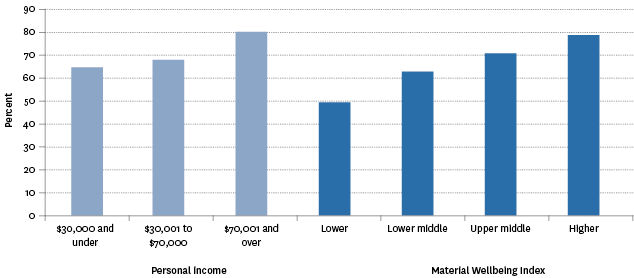Social connectedness
Trust in others
Definition
The proportion of the population aged 15 years and over who reported that most people in New Zealand can be trusted.
RelevanceTop
Trust in others is an important indicator of how people feel about members of their community. High levels of trust facilitate co-operative behaviour among people and contribute to people’s ability to develop positive relationships with others.
Current level and trendsTop
Figure SC4.1 – Proportion of population aged 15 years and over by levels of
trust in others, 2014

Source: Statistics New Zealand, New Zealand General Social Survey
Age and sex differencesTop
In 2014, people in the younger age groups (65.4 percent of those aged 15–24 years, and 63.5 percent of those aged 25–34 years) were less likely than people in the older age groups (73.4 percent of those aged 65 and over) to say that most people can be trusted. The rates for those aged 35–44 years, 45–54 years and 55–64 years were 69.8 percent, 68.5 percent and 69.7 percent respectively.
The proportions of people aged 15 years and over who said most people can be trusted were similar for males (69.0 percent) and females (67.8 percent).
Ethnic differencesTop
In 2014, people in the Asian (73.2 percent) and European/Other (70.2 percent) ethnic groups reported higher levels of trust than Pacific peoples (54.9 percent) and Māori (54.6 percent).
Figure SC4.2 – Proportion of population aged 15 years and over who said they
could trust most people, by ethnic group, 2014

Source: Statistics New Zealand, New Zealand General Social Survey
Socio-economic differencesTop
Levels of trust in others increase as income increases. People with personal incomes of over $70,000 (80.3 percent) reported higher levels of trust than those on lower incomes (68.1 percent of those earning between $30,001 and $70,000, and 64.8 percent of those earning $30,000 or less).
A similar pattern emerged with material wellbeing. Those in the higher material wellbeing index category (78.9 percent) had much higher levels of trust in others than people in the lower material wellbeing index category (49.4 percent). Those in the upper middle and lower middle categories had rates of 70.9 percent and 62.9 percent respectively.
Figure SC4.3 – Proportion of population aged 15 years and over who said
they could trust most people, by personal income and Material Wellbeing
Index, 2014

Source: Statistics New Zealand, New Zealand General Social Survey
Labour status differencesTop
In 2014, unemployed people (50.1 percent) were less likely than employed people (70.1 percent) and people not in the labour force (66.9 percent) to report trusting most people.
Family type differencesTop
People in sole-parent families (53.5 percent) were less likely than people in other family types to have trust in most people in New Zealand. People living in a couple without children (73.5 percent) and people living in a couple with children (70.3 percent) had the highest levels of trust among the different family types in 2014. Around two-thirds (64.5 percent) of people not in a family nucleus said most people could be trusted.
Migrant status differencesTop
In 2014, people who had arrived in New Zealand within the last five years (80.5 percent) were more likely to report that most people could be trusted, compared with longer-term migrants (73.7 percent) and those born in New Zealand (65.9 percent).
Regional differencesTop
In 2014, those living in Wellington (74.3 percent) had the highest levels of reported trust in others, followed by Southland (71.9 percent). People living in Northland (57.6 percent) and Gisborne/Hawke's Bay (59.9 percent) reported the lowest levels of trust in others.
International comparisonTop
New Zealand's reported level of trust in other people (69 percent in 2007, using a different survey from the NZGSS) was above the median of 61 percent for 30 of the OECD countries. Denmark had the highest reported level of trust in people (89 percent in 2008), followed by Norway (88 percent in 2008), Finland (86 percent in 2008) and Sweden (84 percent in 2008). The United Kingdom reported the same level of trust as New Zealand (69 percent in 2008), while Australia (64 percent in 2007) and the United States (49 percent in 2007) reported lower levels.
Data for this section can be found at: www.socialreport.msd.govt.nz/documents/2016/sc4.xlsx

